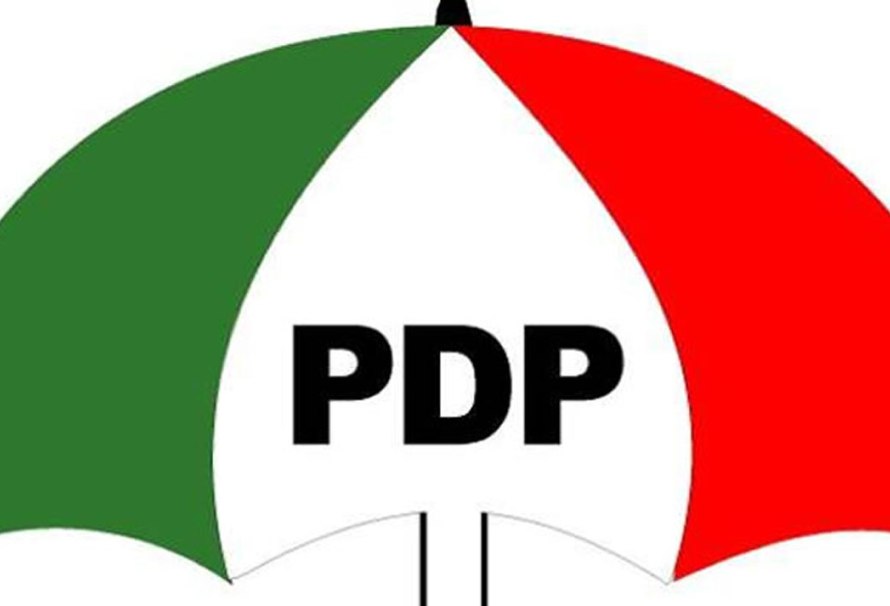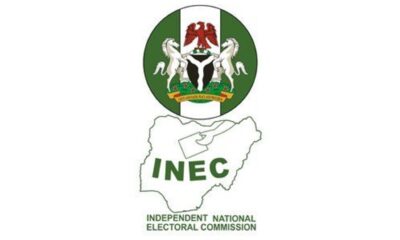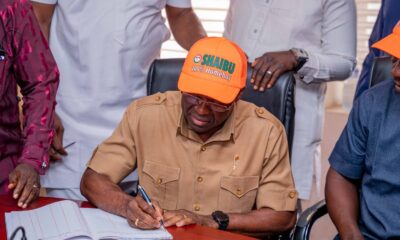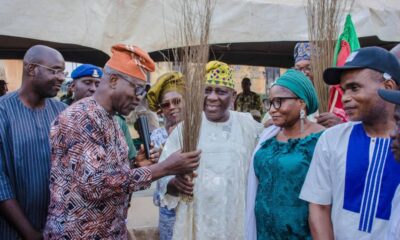Politics
“Will Attract Disciplinary Action” Judge Warns INEC On Failure To Comply With Ruling On PDP Convention

A Federal High Court in Abuja Tuesday ordered the Independent National Electoral Commission (INEC) not to participate in the People’s Democratic Party (PDP) convention slated for Port-Harcourt Wednesday by monitoring it.
Justice Okon Abang, in a ruling Tuesday, reaffirmed his interim orders made on Monday, directing parties to suspend the scheduled national convention of the PDP.
He converted them to interlocutory injunction to last until the determination of the substantive suit filed by Ali Modu Shariff and other members of his leadership of the party.
The ruling was on a motion on notice for interlocutory injunction argued Tuesday by plaintiffs’ lawyer, Adeniyi Akintola (SAN).
Justice who faulted the decision of the Port Harcourt Division of the Federal High Court to assume jurisdiction on the case relating to the PDP convention, directed that his order be accompanied with Form 48 (Notice of disobedience of court order) and served on the INEC Chairman and Secretary.
He said failure by INEC or any of the defendants to comply with his order “will attract disciplinary action” provided “the plaintiffs know what to do.”
The judge also directed the Inspector General of Police (IGP) to among others, ensure the enforcement of the court orders.
The judge held that the motion was not opposed as the respondents, including members of Ahmed Makarfi-led caretaker committee of the party, failed to file a counter-affidavit opposing the motion.
He said the Makarfi-led caretaker committee members, who were only on Tuesday joined as the third to the ninth respondents adopted strategy of not filing counter-affidavit but filed other processes that were not placed in the court file.
Justice Abang said the request for an adjournment by lawyers to Makarfi and others – Yunus Ustaz (SAN) and Ferdinand Orbih (SAN) – after the plaintiffs’ counsel, Chief Adeniyi Akintola (SAN), had moved his motion was an afterthought.
“Having asked the court to adjourn to the next day to enable him filed response to the plaintiffs’ processes, the lawyer to the 3rd to 9the defendants (Makarfi and eight other members of his committee) have waived their right to be served within seven days,” the judge said.
He noted that, rather than file a counter-affidavit to the plaintiffs’ motion for injunction; defendants’ lawyers chose to file other processes that were only referred by the lawyer, but not placed in the court’s file.
“The issue of asking for an adjournment is an afterthought. Therefore, a counsel will sink or float with the decision taken by him in the discharge of his professional duties to his client,” the judge said.
Noting that lawyer to the PDP, Olagoke Fakule (SAN) and that of INEC, Alhassan Umar, did not oppose the motion for injunction, the judge said: “In any case, the plaintiffs’ application is not opposed by any of the parties.
“The law must take its course. The facts placed before this court are unchallenged and uncontroverted by the respondents when they had the opportunity to do so. The facts deposed to by the plaintiffs are credible.
“The plaintiffs’ application is not opposed by any of the parties. I so hold. The defendants have not filed counter-affidavit to the application. They have opportunity of filing counter-affidavit and they failed to do so. The law must take its course.
“It is my view that the facts placed before the court are unchallenged and uncontroverted by the defendants when they had the opportunity to do so. They had opportunity to file counter-affidavit, they failed to do so; they filed preliminary objection.
“Their objection was not in the court’s file. I rely on the authority of the Supreme Court. The facts deposed to by the plaintiffs are credible and are deserving to grant the application in the overall interest of justice.
“The plaintiffs’ application therefore succeeds and is accordingly granted as prayed in line with the reliefs endorsed on the motion paper dated July 20, 2016 and I make the following orders:
“An order of interlocutory injunction is hereby made restraining the defendants (the nine of them), their servants, agents, howsoever named from conducting the national convention of PDP and from supervising or monitoring same under any guise and for electing any national officer of the (second) defendant (PDP), and for recognising same in any manner whatsoever pending the determination of the substantive suit.
“An order of interlocutory injunction is hereby made restraining the PDP from presenting anybody and from sponsoring anybody for election into its offices and holding national convention, conference whatever name for the purpose of electing national officers of the second defendant pending the determination of this suit.
“Prayer 3 is refused. The orders of Buba J. and the order Idris J. are subsisting. You can take step to enforce the order. Prayer 3 is hereby refused and accordingly struck out. I so hold.
“An order of interlocutory injunction is hereby made restraining the INEC from monitoring the national convention of PDP scheduled for Port Harcourt on Wednesday, August 17, 2016 or any other day and from accepting, publishing or recognising, conference or convention howsoever named being planned by second defendant.
“The Inspector-General of Police shall enforce the order until all applications are disposed of.
“The plaintiffs shall endorse Form 48 and serve and all the defendants, especially INEC to accompany the order.
“Learned counsel for INEC shall inform the Chairman of the INEC of the court’s decision and failure to comply with the order of the court will attract disciplinary action against any party in disobedience provided the plaintiffs know what to do,” the judge said.
Justice Abang blamed the judge in the Port Harcourt division of the Federal High Court for the conflicting orders that had so far been issued by him and from Port Harcourt on the issue of PDP convention.
“The Federal High Court, having regard to Section 249(1) of the Constitution, is one court, but with several divisions, for administrative convenience to bring administration of justice nearer to the people.
“The issue of whether or not the PDP should hold its convention was raised by the plaintiffs in this suit. The case was assigned by the Chief Judge to this court on the 4th of July. Assigning a case to a judge is a constitutional duty of the Chief Judge of this court and no person can question it because it is an administrative decision.
“The issue of whether the PDP should hold its convention, having been assigned to this court, no other division of the Federal High Court ought to preside over the matter in the same manner, so as to avoid conflicting decisions,” he said.
The judge noted that in any civilised country, like Nigeria where there is the Court of Appeal to correct any error that may arise from the proceedings of this court, parties ought to have availed themselves such opportunity rather than going before another division of the Federal High Court with the same suit.
Justice Abang said, although he lacked the power to review the decision of the other court, except it was a nullity, the judge in the other division ought to have drawn the court’s Chief Judge’s attention to the new case filed before it on the same issue already before the Abuja division.
He said the unenviable situation today would have been avoided if the judge in the Port-Harcourt division of the court had refused to assume jurisdiction over a case filed on August 9 after the Abuja division was already handling similar case filed in July.
Justice Abang, who queried the jurisdiction of the Port-Harcourt court over the matter, where parties like PDP and INEC have their headquarters in Abuja, said his court was not struggling jurisdiction with the Port Harcourt division, but that it is concerned about the conflicting decisions.
“The attitude of my brother judge in Port-Harcourt is what the Supreme Court condemned in the case of NIBS v. Union Bank reported in part 2004 NWLR.
“Therefore, the Port-Harcourt division of the Federal High Court cannot make an order neutralising the order made by this court.
“This is so because a court of coordinate jurisdiction cannot make an order that has the effect of overruling the order made by this court on the 28th of July restraining parties from taking any steps in relation to the subject matter of this suit. Any person that disobeys the court will have himself to blame. Nobody should bring himself with the direct confrontation of this court,” Justice Abang said.
The judge expressed discomfort over media report about the comments reportedly made by Prince Dayo Adeyeye (who is the 8th defendant in the case and a member of the Makarfi committee) castigating the court and judge for the interim orders made on August 15.
The judge said, but for the fact that the court is patient, it would have moved against Adeyeye for assuming judicial powers to query court’s decision and make disparaging comments about the court.
Further hearing in the substantive suit has been adjourned September 7.
Among prominent PDP members in court Tuesday was businessman, Jimoh Ibrahim.
Thenation







